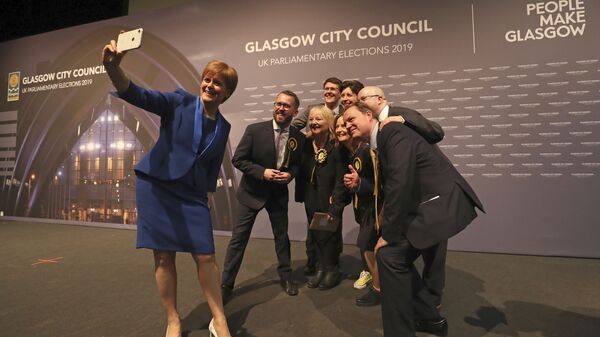Scottish first minister, Nicola Sturgeon, has renewed calls for a second independence referendum following major gains from her party in the 12 December general election.
Mrs Sturgeon, speaking to the BBC, said that her party's gains beat her expectations and that it was a "clear endorsement of the SNP's message".
— BBC Politics (@BBCPolitics) December 13, 2019
She said: “Scotland couldn't be clearer that we don't want a Boris Johnson government, we don't want Brexit and we want Scotland's future to be in Scotland's hands not dictated to us by Boris Johnson’s conservatives.
Whilst she "reluctantly" accepted that the PM Johnson had mandated taking England out of the European union, she said: “he does not have a mandate to take Scotland out of the European Union."
“And I have a mandate, a renewed, refreshed, strengthened, mandate to offer people in Scotland the choice of a different future", she said, adding that it was "up to the people of Scotland" to choose.
She told the BBC: "I don’t pretend that everybody who voted SNP yesterday will necessarily support independence but there is a clear endorsement that Scotland should get to decide our future and not have it decided for us.
— The SNP (@theSNP) December 13, 2019
Speaking on whether she would write Mr Johnson requesting a fresh referendum under Section 30 order of the Scotland Act 1998, she said that she had "put forward a plan".
"I put forward a plan", she said. "That plan has been endorsed. The Scottish Conservatives opposition to that plan has been roundly rejected.“
“It's not me that should be thinking of a plan B because my plan A has won the election," she concluded.
The news comes over five years after Scotland launched its independence referendum, in 2014, which was defeated 55 to 45 percent in favour of remaining in the British Union.
12 December Elections: Winners Take All
The SNP took seats from the top three political parties across Scotland, including in East Lothian, Angus, Midlothian, Rutherglen and East Renfrewshire, among others, whilst holding onto Perth and North Perthshire, The National reported, adding that Lib Dems leader Jo Swinson was also forced out in East Dunbartonshire.
Despite this, the Tories made significant gains across the UK, allowing UK prime minister Boris Johnson a boost in support in Commons to push through his Brexit deal. Conservatives gained 364 seats out of 650 seats across the UK, including numerous 'left-behind" constituencies across the Midlands and northeast England, with Labour, SNP, Lib Dems, and Democratic Unionist Party earning only 203, 48, 11, and 8, respectively.
— Simon Fraser (@SimonFraser00) December 13, 2019
Labour's Jeremy Corbyn also announced on Friday he would step down as party leader after a "period of reflection", following a crushing loss of 59 seats.
The British Prime Minister has repeatedly said that he would take the UK out of the EU "come what may" following his instalment into office in late July and after snap elections were triggered in late October. The UK has been mired in a major deadlock over Brexit since the 23 June 2016 EU referendum, where 52 to 48 percent of Brits voted to leave the European bloc, with a current deadline of 31 January 2020.



